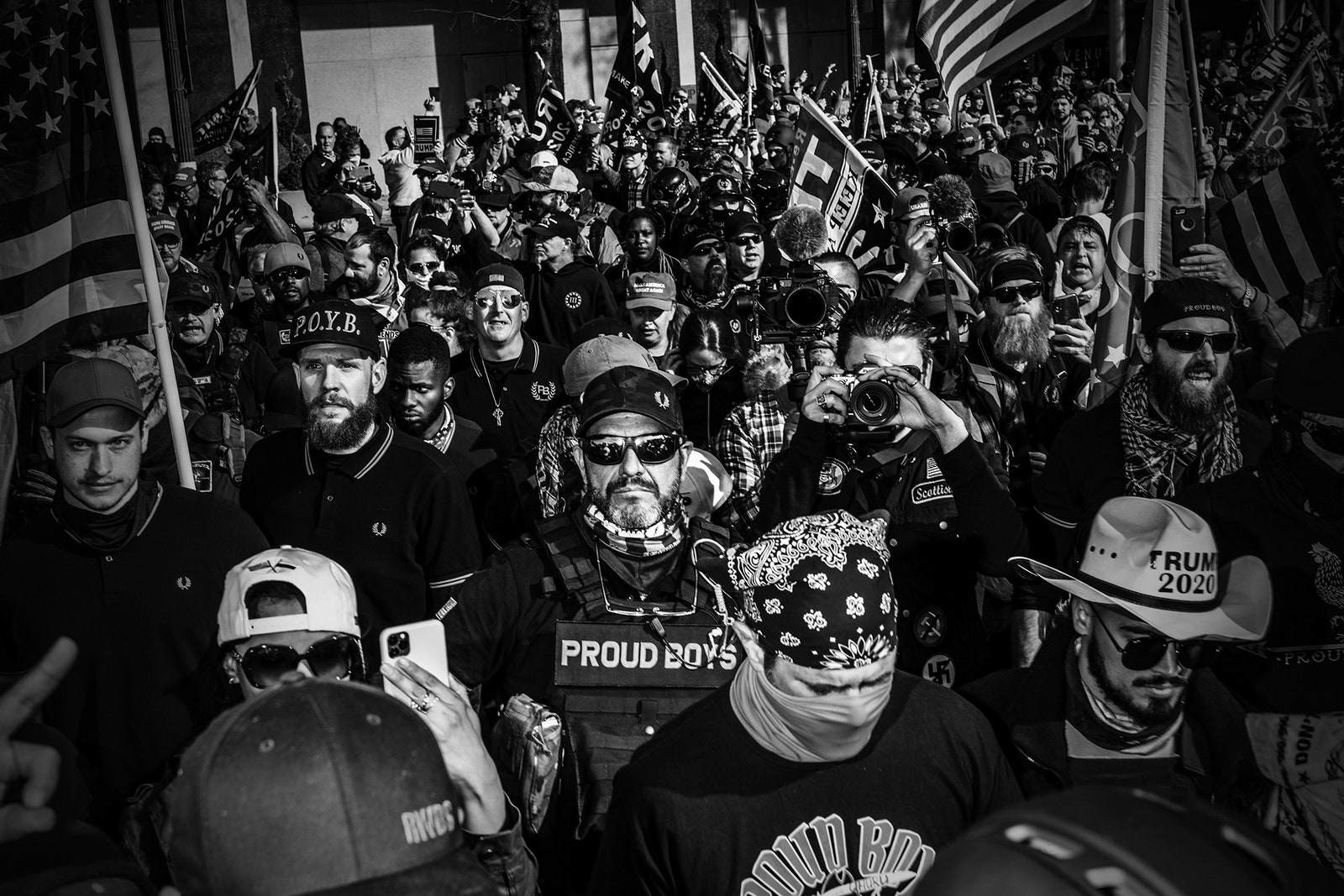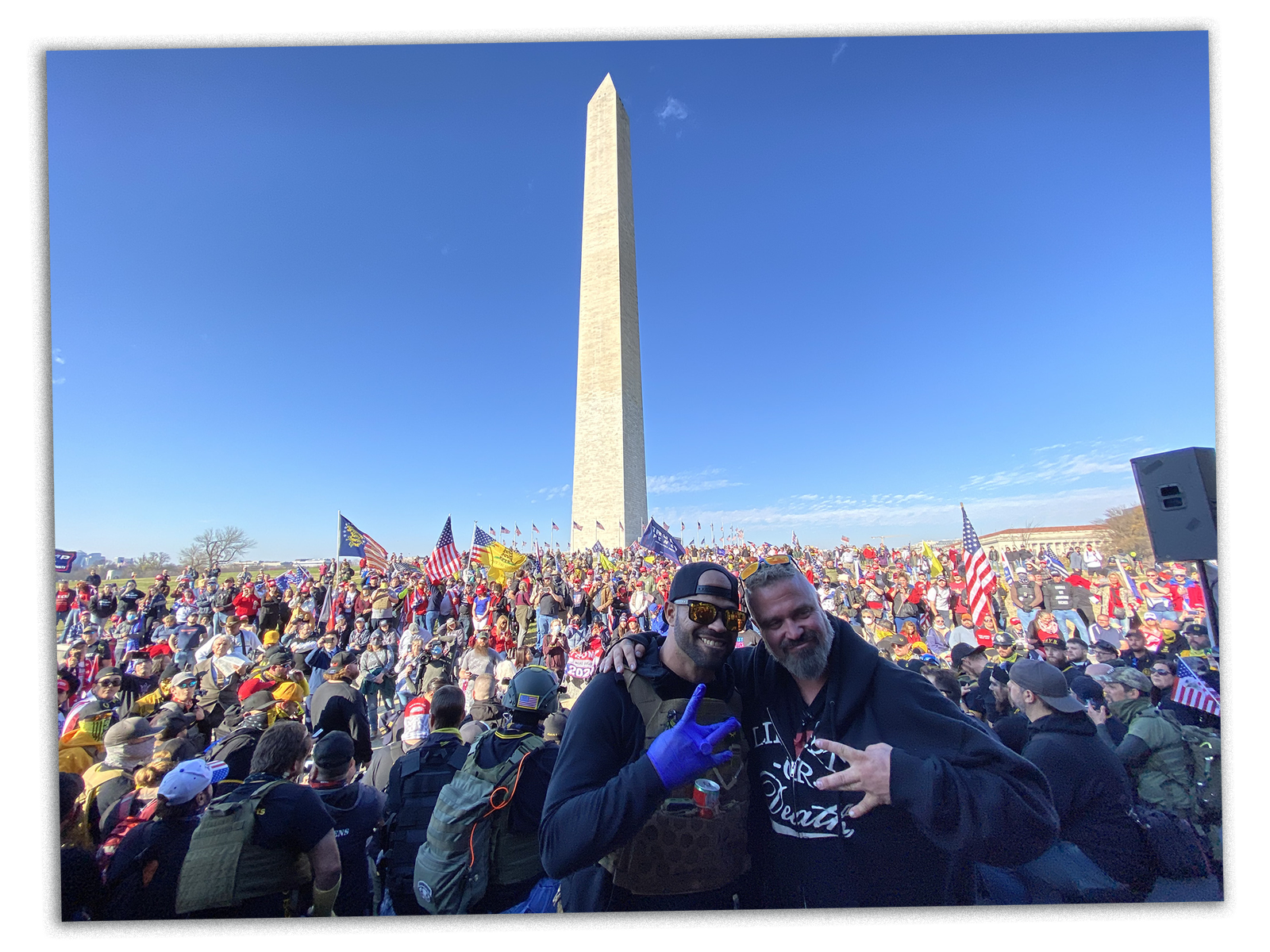Proud Boys leader Enrique Tarrio, who’s Cuban, has tried to sell the group as “rough around the edges,” but welcoming to people of color. Many of those who’ve bought the message are fixated on proximity to power at any cost.
Enrique Tarrio, a onetime political candidate and the Florida state director of Latinos for Trump, is something of a legend in Proud Boys lore. Not only is he the chairman of the group—a position he inherited from founder Gavin McInnes in 2018—he has also claimed to be the owner of the online retail store 1776, where buyers can purchase all types of far-right merchandise, including Latinos for Trump baby onesies (currently on sale for $22), and T-shirts emblazoned with the faces of President Joe Biden and Vice President Kamala Harris and the tagline “SAY NO! to China Joe and The Hoe.” He also helped organize the End Domestic Terrorism event held in Portland, Oregon, in August 2019, which brought together hundreds of protestors from various far-right groups and even more counterprotesters. Tarrio, who had traveled to D.C. after Donald Trump’s incendiary call to support his stolen-election conspiracy theories, was arrested January 4 on one misdemeanor charge of destruction of property and two felony charges for possession of firearm magazines, and was ordered to stay out of the city until his next court date. (He pleaded not guilty to the charges.)
Last week, Reuters reported that, in addition to leading the Proud Boys, Tarrio had been an informant for both local and federal law enforcement, “repeatedly working undercover for investigators after he was arrested in 2012.” (Tarrio denied to Reuters that he had worked undercover or cooperated in cases against others.) It’s an unexpected yet not altogether surprising turn of events from someone who’s spent the majority of his public career moving between the liminal spaces of identity and power. As Proud Boys chairman, he is the head of one of the most vocal anti-democratic groups in recent memory, and as an alleged former informant he would have joined the ranks of people of color coerced into working for the same systems that criminalize and surveil them. Despite the far-right extremist roots of the Proud Boys, Tarrio has consistently positioned the group as more benign, dedicated to so-called traditional family values and freedom of speech. “I get that we’re not everyone’s cup of tea,” he told Business Insider in September. “We’re a little rough around the edges, but we’re definitely not what they make us out to be. I denounce white supremacy, and I denounce fascism and communism.” Tarrio has leaned into identity politics to articulate the group’s inclusivity—a tactic the right has condemned when it comes from the left. “I’m pretty brown,” he said. “I am Cuban. There’s nothing white supremacist about me.”
The presence of people of color in far-right extremist groups is not a new phenomenon; in 2018 the Daily Beast conducted nearly a dozen interviews with Latino, Asian, and Black participants at far-right rallies on the West Coast, many of whom blamed Black people for the disproportionate police violence that befalls their communities. The far-right group Patriot Prayer, which is based in Vancouver, Washington, and has ties to the Proud Boys, was founded by Joey Gibson, who identifies as Japanese American. His “right-hand man,” according to the Daily Beast, is Tusitala “Tiny” Toese, a Samoan American who has been a fixture at right-wing rallies. (In October of last year, Toese was sentenced to six months in jail on a probation violation, having pleaded guilty to a fourth-degree assault charge that January.) Following 2020’s presidential election in which a high number of people of color voted for Trump to remain in office (in some cases in higher numbers than in 2016), questions have arisen about the ideologies of Trump’s nonwhite supporters, their political mindset—and whether their numbers could grow.
Cassie Miller, a researcher with the Southern Poverty Law Center, told me that, while there are no clear statistics on the number of people of color in the Proud Boys, “in 2019 we found 44 different chapters, and the [ethnic] makeup varies by location. Different chapters take on a different character.” She added, “I think joining a group like this shows the contradictory places people exist in society and how they look for different ways of achieving power. With this group it’s not just about white supremacy, but also perpetuating a patriarchal society.” Women are not allowed to join the Proud Boys, Miller noted, and neither are transgender men or gender-nonconforming people.
The Proud Boys, founded in September 2016, became increasingly mobilized and visible over the course of the Trump era. “When they first started, a lot of what we saw was online organizing, dominated by transgressive humor, coordinated trolling campaigns, and trying to shift the terms of political debate,” Miller said. The Proud Boys’ reliance on humor is arguably what led to them being seen as rowdy boys who needed to let off steam, even as their online attacks grew increasingly violent and direct. “They were about using intimidation against people they considered their political adversaries, which included leftists, anti-fascists, anti-capitalists, Democrats, journalists,” she said. “That’s something that I think has become more widely adopted in recent years.”
January’s attack on the Capitol and its fallout brought the threat of violence from right-wing groups to the forefront—so much so that the Biden administration has appointed an official to monitor white supremacists. Biden himself is being called on to address the threat head-on, while many of Trump’s supporters are continuing to stick by the former president, including the majority of Senate Republicans and numerous far-right organizations and militias. The Trump administration’s egregious 1776 report was a fitting coda to a presidency that emboldened not only white supremacist rhetoric, but also attracted those whose ideals are misogynistic and xenophobic.
Omar Wasow, an assistant professor in the Department of Politics at Princeton University, has been studying race and politics in the United States for nearly two decades, and noted how the shift in what defines whiteness has influenced who is drawn to organizations like the Proud Boys. “White supremacy is not just for white people anymore. You can invite anybody into this ideology and different individuals are motivated by different things,” Wasow said. Born to Cuban immigrants and raised in Little Havana, Miami, Tarrio said he was lured to the group by its atmosphere, which reminded him of his family and childhood. “My house, at like 7 o’clock in the morning, there’s like 20 people...talking about politics, roasting each other...I was brought up in that environment, so that kind of brings me into the fuckery that comes along with being a Proud Boy,” he told Heavy in 2018.
In November, Kyle Chapman, the founder of a “tactical defense arm” of the Proud Boys, attempted to undermine Tarrio and establish the group as explicitly white and anti-Semitic, according to the South Florida Sun Sentinel. But other factions have used their ideologies to draw in a more diverse membership. “I think it’s important to keep in mind that white supremacy has always been composed of multiple strands,” said Wasow. “Some of it is literally about white domination over Black people, but some of it is also about deep anti-Semitism. Some of it in the past has been anti-Catholic and that speaks to how the boundaries of whiteness have changed over time.”
The Proud Boys has also turned to Christianity as a major selling point. According to a screenshot shared on Reddit, prior to his January arrest, Tarrio posted his own rendering of Isaiah 54:17 to the social media site Parler, where many far-right voices have flocked after being kicked off other platforms, before the app itself was widely banished from the internet: “You can’t put an idea in chains…You can’t sue it…You can’t destroy it...The only thing that can defeat it…Is a better idea…So sue me put me in chains or attempt to destroy me. The armor of God protects me.” According to Jason Stanley, author of How Fascism Works and a philosophy professor at Yale, Christianity’s entrenched conservatism is fertile ground for far-right politics. “What you have in the U.S. is Christian nationalism, so Christianity is very central to what’s going on,” Stanley said. “Generally, Black Christians have been the vanguard of Black liberation movements in the United States…so it’s white Christianity with a morality that says there’s a vengeful God who will punish those who don’t follow.” Tarrio’s Proud Boys and Gibson’s Patriot Prayer often invoke Christianity in their rhetoric against the left. “What is right-wing conservative ideology?” said Stanley. “It’s religious, it’s patriarchal, it’s nationalistic.… If your identity is a fundamentalist, homophobic, anti-feminist nationalist, you’re gonna like Trump more than you’re gonna like Kamala Harris.… That’s what Trump represents.”
At its core, the prosperity doctrine of white supremacy is a function of the American idea of meritocracy—that success comes to those who work hard enough. Anyone can buy into that, regardless of whether the system truly works for them. “Think of America from its founding as having a sort of dual state,” Wasow said. “There was a rights-granting democracy for white men, and in particular, white male property owners, and for Native Americans and African Americans there was a sort of predatory state. Native Americans were dispossessed of their land and African Americans of their labor. So you have these two different regimes coexisting in the same political unit of a country.” For people like Tarrio, Gibson, and Toese, it would seem that even proximity to power is better than no power at all. “The Proud Boys work as a kind of gang that is helping to enforce the interests of people in power, but operating at just enough of an arm’s distance that people in power can say, ‘I helped organize the rally but I never intended for people to engage in violence,’” Wasow said. “So there’s a kind of plausible deniability for those within the system that this arrangement allows.”
















